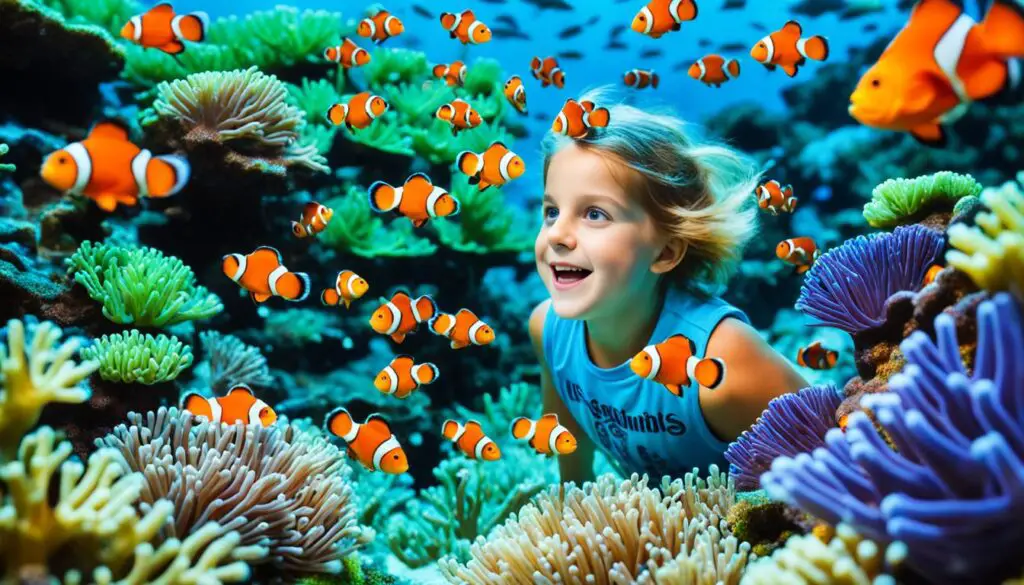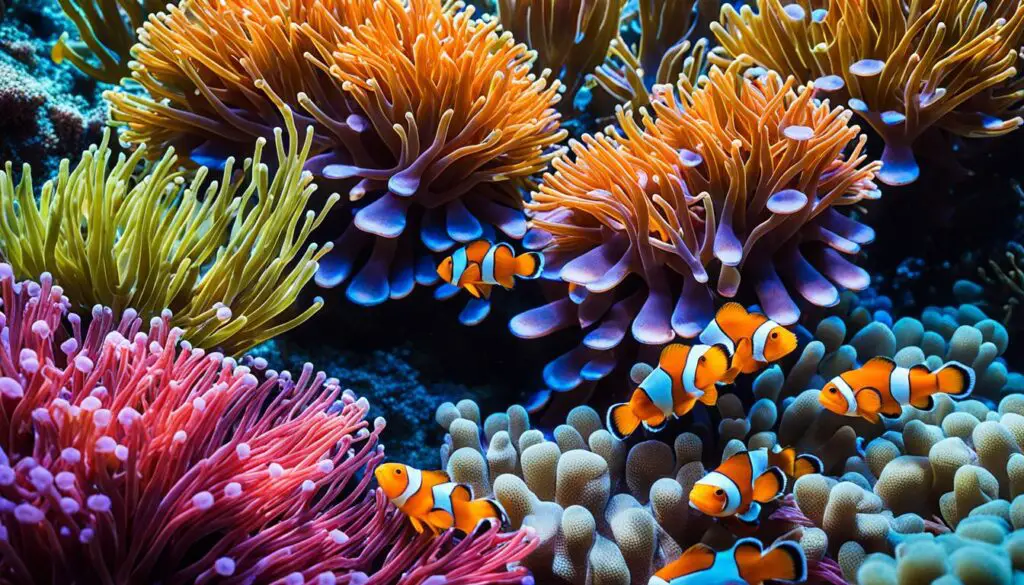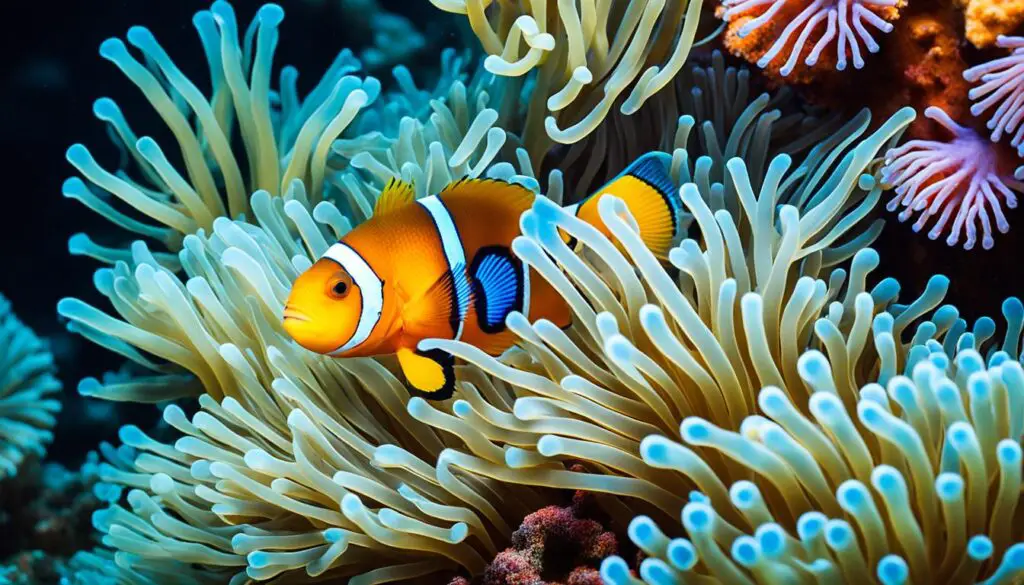Aquatic Species Conservation: Champions of the Sea: Dive into Aquatic Species Conservation!
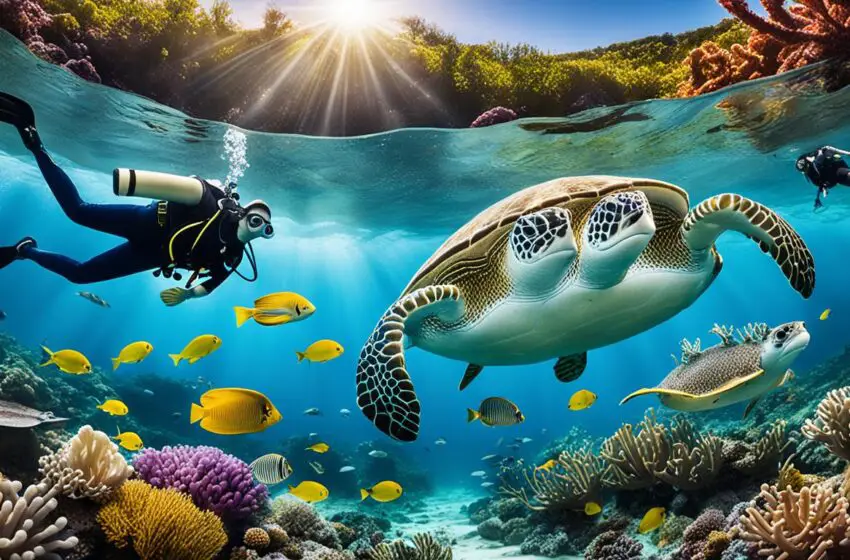
Welcome to an underwater adventure. Here, we will explore the vital world of aquatic species conservation. Our journey will take us into the beauty of coral reefs and their rich biodiversity. Together, we’ll learn about the key role of data and sustainable practices in protecting our oceans.
Did you know coral reefs house a quarter of marine life and feed over 1 billion people? Yet, these rich ecosystems are at risk from global warming. It’s estimated that by 2050, live coral might drop by 70-90%. This poses a big threat to the balance of sea life.
The United Nations started the Decade of Ocean Science for Sustainable Development. This effort, from 2021 to 2030, focuses on coral reef data. Its goal is to use science in ways that help save these environments. You have a part to play in this.
Tourists and others visiting coral reef sites are important in gathering data. Your keen eyes and notes help scientists understand better. This understanding leads to smart choices for saving our oceans. By supporting groups like the Reef-World Foundation and UNEP, we can boost sustainable visits to coral reefs. In this way, we protect these crucial parts of the sea.
Key Takeaways:
- Aquatic species conservation is crucial for saving marine life, especially coral reefs.
- Coral reefs are the home of a quarter of all marine life and feed over 1 billion people.
- The UN’s Decade of Ocean Science works to gather important data on coral reefs.
- Citizen scientists, including tourists, help greatly by sharing their findings.
- Cooperation between groups like the Reef-World Foundation and UNEP advances responsible coral reef visits and the gathering of scientific knowledge.
The Ocean’s Plight and the Need for Support
The world’s oceans are in trouble. They face a crisis from plastic pollution, overfishing, climate change, and habitat destruction. These issues are causing a drop in marine life variety and upsetting the ocean’s balance.
We need to help organizations that protect the ocean. They work on using resources wisely and teaching people about ocean importance. This helps bring back health to marine areas.
Plastic is a big threat to sea animals and their homes. It’s predicted that by 2050, the ocean might have more plastic than fish. We must tell others about plastic harm and support actions against waste.
“The oceans are the planet’s life support system, and we are putting their stability at risk through our actions.” – Sylvia Earle
Too much fishing also harms the ocean. It can make fish numbers drop and mess up the food chain. We should back groups that work on fishing the right way to save sea life and help coastal people.
Climate change makes the oceans more vulnerable. It causes warmer seas, more acid, and higher water levels. Supporting groups that fight climate change with smart solutions is critical for a healthy ocean future.
Losing habitats like coral reefs hurts sea life variety. We can help by supporting projects that keep these areas safe. This way, we can protect places where many living things depend on.
We can change things for the better by working together. Let’s support ocean protection to keep the balance in nature. This will ensure a lasting, healthy future for our seas.
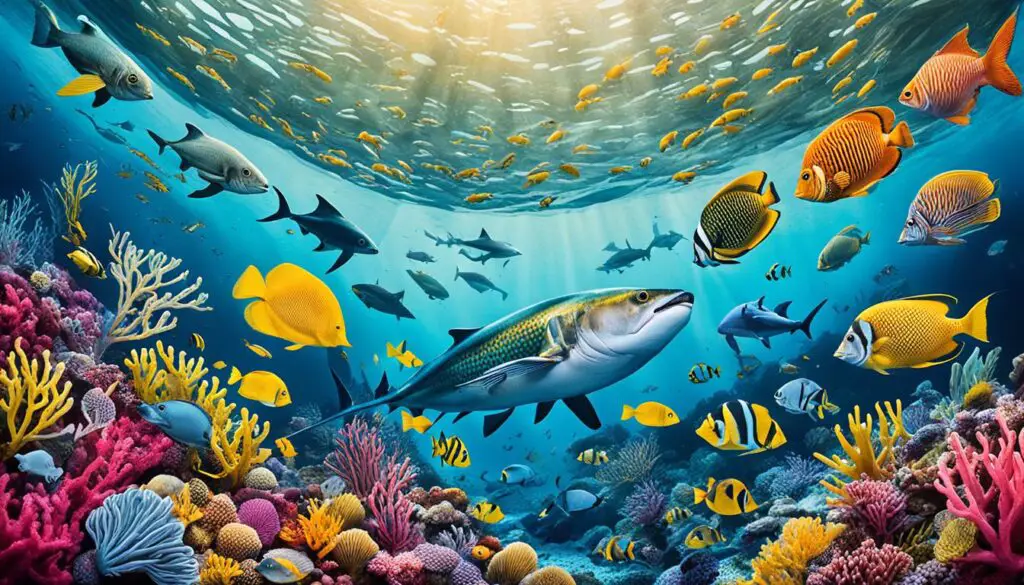
Threats to Marine Ecosystems
| Threat | Description |
|---|---|
| Plastic Pollution | Excessive accumulation of plastic waste in the ocean, harming marine life and habitats. |
| Overfishing | Unsustainable fishing practices leading to the depletion of fish populations. |
| Climate Change | Rising temperatures, ocean acidification, and sea-level rise impacting marine ecosystems. |
| Habitat Destruction | Destruction of critical habitats such as coral reefs and coastal areas, disrupting marine biodiversity. |
Top Organizations Leading the Way in Ocean Conservation
Many groups are at the front of ocean conservation. They fight plastic pollution, overfishing, and climate change. They work globally to bring our oceans back to life.
The Ocean Cleanup
The Ocean Cleanup works on new systems to fight plastic waste. They began with the Great Pacific Garbage Patch.
Ocean Conservancy
Ocean Conservancy leads a big worldwide effort for ocean health. They do this through the International Coastal Cleanup.
Surfrider Foundation
Surfrider Foundation pushes to stop using single-use plastic bags. This helps cut plastic waste in our beaches and seas.
Project AWARE
Project AWARE gets scuba divers around the world to clean up the seas. They also collect important data using their Dive Against Debris program.
Greenpeace Oceans
Greenpeace Oceans aims to create protected zones in the sea. They tackle many problems that harm our ocean life.
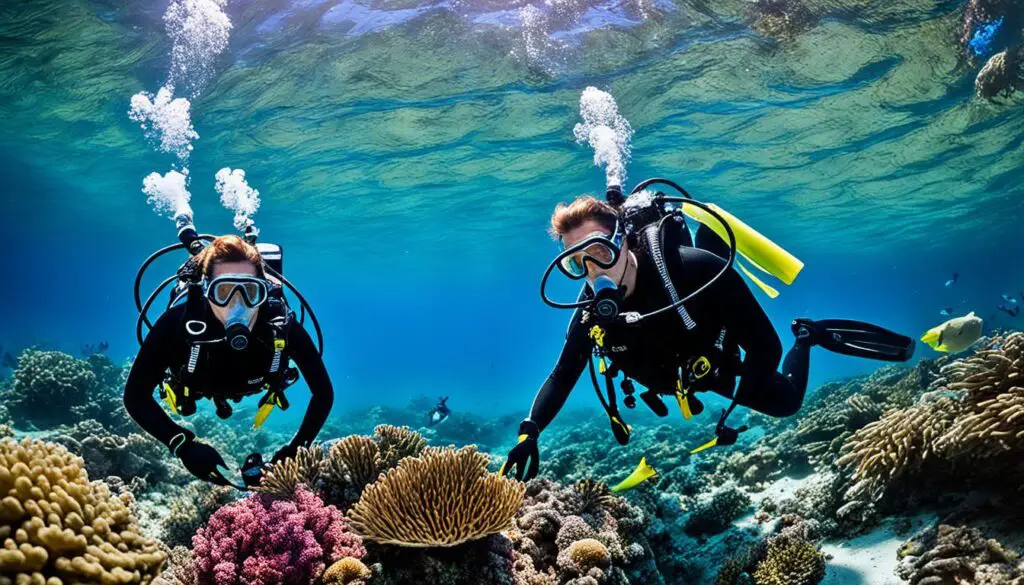
This is a photo of volunteers working underwater and cleaning up. These groups are hard at work protecting our oceans.
| Organization | Focus | Initiative |
|---|---|---|
| The Ocean Cleanup | Plastic Pollution | Developing innovative cleanup systems |
| Ocean Conservancy | Ocean Health | International Coastal Cleanup |
| Surfrider Foundation | Plastic Pollution | Advocating for plastic bag bans |
| Project AWARE | Underwater Cleanup | Dive Against Debris program |
| Greenpeace Oceans | Marine Ecosystems | Campaigning for protected areas |
Conclusion
Preserving the ocean is crucial for our planet’s future. We all need to support groups that work on ocean conservation. And joining global efforts to stop the environmental crisis our oceans face is vital. By making small changes in our daily routines, promoting public awareness, and working together, we can help our seas heal.
We each need to step up and protect our seas. Together, we can create change. We can ensure a better future for ocean life. Let’s unite and strive for a healthy, vibrant ocean for the next generations.
FAQ
What is aquatic species conservation?
Aquatic species conservation is about saving marine life and their homes. It aims to keep species diversity alive, balance ecosystems, and keep these animals and plants safe for the future.
Why are coral reefs important?
Coral reefs are key for marine life diversity and health. They help a quarter of known marine animals live and support over 1 billion people. Besides, they defend shores, support medicine, and boost tourism.
What is the United Nations Decade of Ocean Science for Sustainable Development?
The UN Decade of Ocean Science, running from 2021 to 2030, wants to get better data about our seas. It targets oceab once and emphasizes sustainable actions. It also invites people, like tourists, to help with studies.
How do citizen scientists contribute to aquatic species conservation?
Citizen scientists, who include tourists at coral reefs, are vital for gathering data. They share what they see, which scientists use to fill research gaps. This teamwork improves our knowledge and helps protect our seas.
Can individuals support ocean conservation efforts?
Yes, anyone can help the oceans. This involves backing eco-friendly fishing, reducing plastic use, and spreading ocean awareness. Joining cleanups and supporting ocean groups are also big helps.
Which organizations are leading the way in ocean conservation?
Many groups are making waves in ocean protection. The Ocean Cleanup fights plastic waste. The Ocean Conservancy runs a big cleanup event. The Surfrider Foundation wants a stop to plastic bags. Project AWARE and Greenpeace Oceans also take action to keep the seas safe.
Why is ocean conservation important?
Ocean care is crucial for keeping the environment balanced and saving sea creatures. It also aids in managing natural resources well and tackling big issues like plastic waste and climate change. By supporting these efforts, we protect the ocean and its people.

